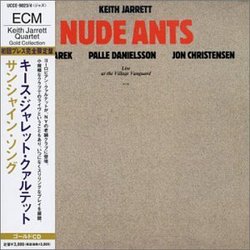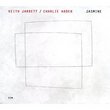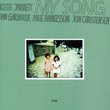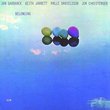| All Artists: Keith Jarrett Title: Nude Ants (Mlps) Members Wishing: 1 Total Copies: 0 Label: Universal Japan Original Release Date: 1/1/2007 Re-Release Date: 3/14/2007 Album Type: Import, Limited Edition, Original recording remastered Genres: Jazz, Pop Styles: Modern Postbebop, Bebop Number of Discs: 1 SwapaCD Credits: 1 |
Search - Keith Jarrett :: Nude Ants (Mlps)
 | Keith Jarrett Nude Ants (Mlps) Genres: Jazz, Pop
Japanese limited edition reissue of 1979 album live at the Village Vanguard, 24 carat gold disc packaged in a gatefold miniature LP sleeve. ECM Records. 2002. |
Larger Image |
CD DetailsSynopsis
Album Description Japanese limited edition reissue of 1979 album live at the Village Vanguard, 24 carat gold disc packaged in a gatefold miniature LP sleeve. ECM Records. 2002. Similar CDs
|
CD ReviewsFour Out of Six Ain't Bad Gustave O. Frey | Oracle, AZ | 02/08/2007 (5 out of 5 stars) "This release contains four very, very good songs that should be heard if you have an interest in jazz that relies heavily on the blues. "Chant of the Soil" is very bleak, suave and wary of its surroundings, like one of the big cats marking its territory. All four of the good songs ("Chant...", "Innocence," "New Dance," and "Sunshine Song" have similar formats. Garbarek's horn is absent in the intro and Jarrett plays off of the bass and drums with arrangements that serve both as intros and improvisations. This approach is very good because it eases you into the song and breaks down the standard jazz format. It's more of a blues format actually, where the instrumental intro leads into the vocals, in this case Garbarek's saxophone, which performs both vocals and instrumental improvisations. In all four songs, Garbarek gets carried away in his improv, with altissimo extensions that suddenly come soaring down into the lower registers and then back up into the altissimo range. All four of the musicians come ready to play and the four compositions mentioned offer plenty of room for them to do so. In "Innocence," Jarrett's right hand offers the steadiness of the Godhead and his left hand fumbles around beautifully for the chords that make up this song's exquisite structure. The left (human) hand gains confidence from its discourse with the right hand and, by the time Garbarek's improv comes around, Jarrett has set up a foundation from which the shaky human spirit can be propelled into the realm of the immortals. Even with Jarrett's virtuoso keyboard skills, this propulsion cannot be achieved via the piano because it is by definition a percussion instrument. Only a wind instrument can perform a comprehensive purge because only a wind instrument can empty itself completely of all of the sounds it is capable of making, with seamless fluidity, in very short order. Garbarek does this flawlessly and his sheets of sound are incredibly well-executed. With our human needs temporarily met (transcended?), we become absorbed in the Godhead and share in its innocence. On "Sunshine Song," Garbarek does with the tenor what he does with the soprano on "Innocence." His performance on "Sunshine Song" defines a summit beyond which there simply is nowhere to go. (There is a high note even Garbarek can't go beyond and we are reminded that the human infinitude is the one that achieves great significance from the fact that it occurs within stern limits. If we could live forever, life would lose 99% of its significance.) "New Dance" rolls along like a speed boat and you emerge drenched and happy. "Procession" and "Oasis" do not impress me, with the caveat that "Oasis" has a beautiful core melody, which is not developed well. It has a stutter-step clumsiness to it that is charming, but the quartet tries to move forward into the elaboration without the alterations necessary for movement. Garbarek finally gets nutty and blows the roof off with some soprano sheets of sound and this nudges Jarrett briefly into a groove that works. But then it's back the monolithical straight jacket, in which none of the musicians can move correctly. Jarrett's weak ending to the song shows how lost even a great improvisationist can get when all of the white keys suddenly look the same. At least Keith is having a great time. "Solstice" on the "Belonging" release achieves what "Processional" and "Oasis" fail to do. It is also a funeral march of sorts, but the format is so refined that the elaboration simply cannot get cluttered and sloppy. It is during the dark night of the soul that conversion takes place and "Solstice" provides some beautiful night bloomers. And, for all of its diversities, it never leaves the groove, one that, at the end of the song, has Jarrett swirling at the top of his harp, Garbarek fluttering about near the bottom of his tenor and Christensen performing magic with his cymballs. Needless to say, I like "Belonging" too." Sexy Ants W. Noshie | Beirut, Lebanon | 01/09/2007 (4 out of 5 stars) "There is lot of good energy and beautiful music on this double live album, including the 30 minutes "Oasis". Recorded at the Village Vanguard in New York in 1979. Jarrett is accompanied by his European Quartet; Jan Garbarek on Soprano and Tenor, Palle Daniellsson on Bass and Jon Christensen on Drums. Jarrett dominates most of the music, but Garbarek's unique floating tone and the subtle accompaniment of the rest of the band is sure noteworthy. A live album very much worth buying; Highly recommended for all Jarrett's fan; however if you are new to KJ's music, start with "The Koln Concert" instead. Another well recommended studio album For Jarrett with his European Quartet would surely be "My Song". " Excessive and loud vocal noises detract from the music the way I see it | Midwest | 07/22/2010 (3 out of 5 stars) "Normally, I can tolerate Jarrett's vocalizations and consider it the price I must pay to listen to his incredible playing. But on this two-CD set, he's totally out of control. He pretty much ruins the first CD; the second CD is better musically with the fantastic "Oasis", but even then his noises are excessive and detract from the music.
Nonetheless, I am still a huge fan of much of his music and own dozens of his recordings: early American and European quartet stuff, the standards trio, and solo works. Thankfully, most of his other recordings don't come close to how obnoxious his vocalizations are on Nude Ants. If you hate his vocalizations, stay away from this one. If you can tolerate some degree of his noises, you'd still be wise to stay away, as your tolerance may be pushed to the breaking point and beyond. When I first listened to Nude Ants back in the vinyl days, I don't remember being bothered, but some twenty-five years later I am very disappointed and bothered by vocal noises that I would label as excessive, unnecessary, and much too loud." |

 Track Listings (3) - Disc #1
Track Listings (3) - Disc #1

